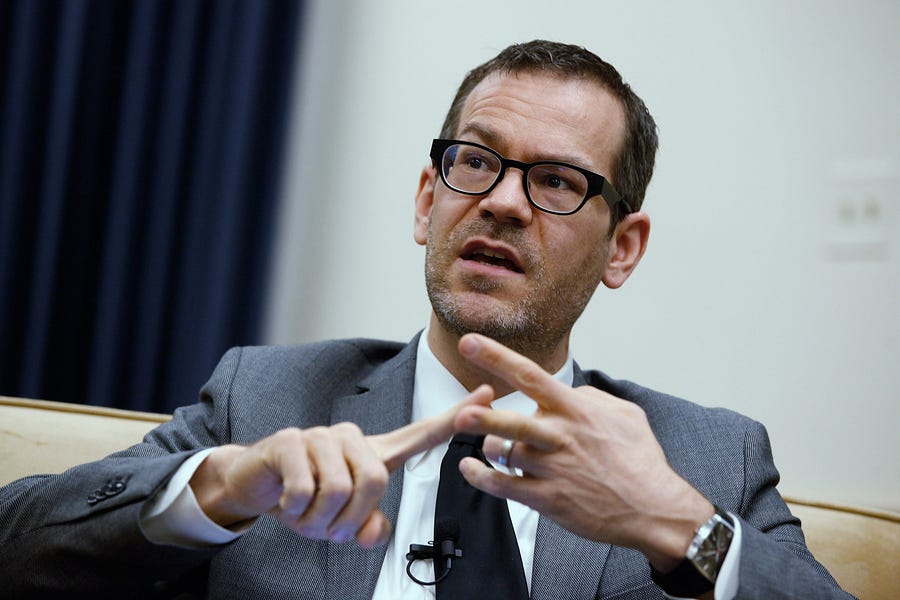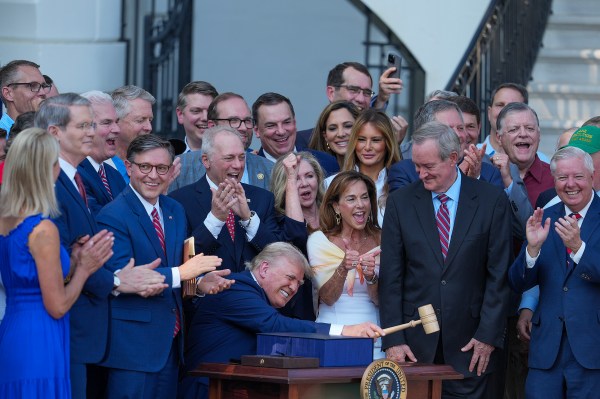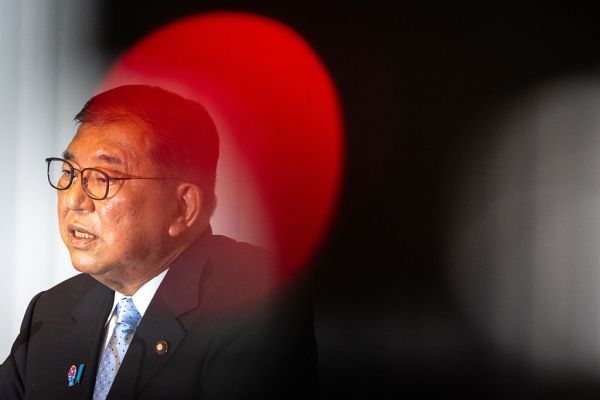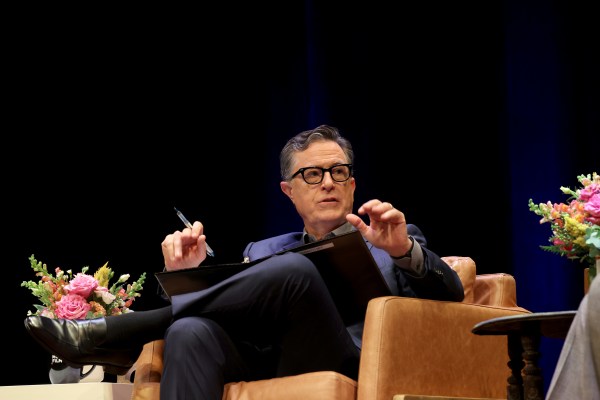When President Joe Biden’s pick for a key Defense Department position appeared before the Senate Armed Services Committee last week, it didn’t take long for the session to turn acrimonious. The panel’s ranking Republican member—Sen. Jim Inhofe—put it bluntly in his opening remarks: “To be clear up front from a policy perspective, I don’t think there is much that we’re going to agree on.” But to Inhofe, a lifelong conservative and political pragmatist, policy differences are no disqualifier.
Inhofe’s real gripe was with what appeared to be the strategic leak of his phone conversation with the former Obama administration official, Colin Kahl, and he said as much. “Even if we disagree on policy issues, we have to have some trust that we can have frank conversations,” Inhofe said. A “slanted view” of the private call was shared with Politico last month by a person claiming that it “may have flipped Inhofe and his concerns,” spurring unease that Kahl or an associate contacted the press to better his odds with Senate Republicans.
But Kahl’s “loose-lippedness” shouldn’t come as a surprise to anyone with an eye on his Twitter feed. For the past eight years, Kahl, who served as the national security adviser to Biden during Obama’s second term, held tight to his limelight through deliberate and often crude candor.
Kahl’s history of divisive public statements targeting GOP lawmakers and Trump administration officials may have helped Kahl rack up more than 100,000 Twitter followers, but it also earned him acute scrutiny from the committee’s 13 Republican members. In one tweet Kahl chastised the political right’s “death-cult fealty to Trump”; in another, he accused the party of “ethnic cleansing.”
So will Kahl’s Senate confirmation go the way of Neera Tanden’s, which was unceremoniously cut short after bipartisan objections to her grating social media presence?
With Kahl’s committee vote on the docket any day now, its outcome remains to be seen. But one could argue that the Pentagon post of undersecretary of defense for policy, for which Kahl was tapped, demands more levelheadedness than most. As the No. 3 civilian in the Defense Department, the undersecretary must balance the gridlocked halls of Congress with the fast-paced and high-stakes world of national security. People skills are a must.
When his Twitter presence came into focus during last week’s hearing, Kahl was quick to offer up an apology. “To state the obvious, the last few years have been pretty polarizing on social media. I’m sure there are times that I got swept up in that,” Kahl said in response to questioning by Sen. Tom Cotton. “There were a number of positions that President Trump took that I strongly opposed. I think the language that I used in opposing those was sometimes disrespectful, and for that I apologize.”
Perhaps anticipating his nomination, Kahl has kept a low-profile on Twitter since the election. But some of his more questionable jabs were posted as recently as the fall of 2020. In one, Kahl shares a Washington Post editorial with the caption: “Let’s not mince words. The Trump administration kidnapped children.” In another, he writes that “Trump is obviously a moron.” While many Americans—including Republicans and conservatives—expressed such sentiments, Kahl is the one up for confirmation.
It doesn’t take much digging to uncover a slew of other polarizing positions on the outgoing administration. “Constantly amazed by how poorly staffed Trump is. He’s a fool surrounded by imbeciles,” Kahl wrote in a 2017 tweet, to which a fellow Obama-era official—Anne-Marie Slaughter—responded that Kahl was “contributing to degradation of public discourse.”
Kahl has also taken aim at a number of GOP senators, including crucial swing votes and members of the Armed Services committee. Sen. Mitt Romney, who has been largely deferential to Biden’s nominees, was the special subject of Kahl’s vitriol during the 2012 presidential election. “Dude needs a map,” Kahl wrote of Romney. “Romney’s Pakistan policy: read Wikipedia entry,” he tweeted the same night.
In one appearance as a campaign surrogate in 2012, Kahl chided then-nominee Romney for his campaign promises to counter Russian geopolitical influence and rejected the presidential candidate’s warnings about Moscow as unfounded. Four years later—and after more than two years as then-Vice President Biden’s national security adviser—Kahl would point to Trump’s collusion with Russian President Vladimir Putin as the reason behind the 2016 election outcome.
“A lot of Kahl’s really partisan comments came in the context of the 2012 presidential election, when he was a surrogate for the Obama-Biden campaign and was incredibly, intensely partisan,” a former senior defense official told The Dispatch.
While it remains to be seen whether Romney will overlook Kahl’s shots at him, Cotton—who Kahl once wrote appealed to “Trump’s inner-authoritarian”—has made his ‘nay’ vote clear. “Your long record of volatile outbursts will have a toxic and detrimental impact on your relationship with Congress,” Cotton told Kahn. “What’s worse, I fear your intemperate manner will create an equally toxic environment inside the Pentagon stifling healthy, robust debate.”
During her remarks, Democratic Sen. Mazie Hirono pointed to the double standard being used to assess Kahl by his Republican opponents, particularly those who defended former President Trump’s public lapses in civility. “That kind of criticism regarding tweets from folks who didn’t say anything about the kind of lying, racist tweets out of the former president I think is pretty rich,” she said.
Republican members of the Senate Armed Services committee argued last week that Kahl’s clearly articulated policy views demonstrate not only partisanship but also poor judgment. In many instances, Kahl’s incendiary predictions about the GOP’s foreign policy moves fell flat.
In early 2018, for instance, Kahl made the ominous declaration that “we are going to die” if John Bolton assumed H. R. McMaster’s position as national security adviser in the Trump administration. Coming from a career national security expert, such comments carry weight. Over the course of Trump’s four-year term, Kahl used his public platform to fear-monger on any number of the president’s foreign policy moves that deviated from those of his predecessor.
As the Biden administration reworks its own strategy in key regions around the world, the U.S. approach to Iran is expected to remain one key area of partisan difference. This situation makes Kahl’s nomination all the more controversial. Iran policy is his area of expertise, but it’s also the realm where he’s gotten a lot wrong.
When Trump in 2018 withdrew from the Joint Comprehensive Plan of Action (JCPOA), or Iran nuclear deal, Kahl predicted “War drums already sounding.” War never came. After the U.S. killed Iranian Quds Force commander Gen. Qassem Suleimani in an airstrike in Iraq, Kahl made two incorrect predictions: first, the event would be what finally drove U.S. forces out of Iraq; second, that war with Iran was once again inevitable. Neither came to pass.
As Kahl focused on expanding the capitulatory diplomacy of the Obama administration, he seems to have missed the strategic realignment taking shape in the Middle East. Under the Abraham Accords, U.S. allies in the region prioritized pragmatic, on-the-ground multilateralism to counter Iranian aggression—building bridges Kahl declared impossible without Israel’s unconditional capitulation to Palestinian peace terms.
Kahl’s personal biases regarding Israel and the Arab Gulf states may have clouded his foresight. On multiple occasions, Kahl has led the charge to move the U.S. Embassy in Israel from its capital of Jerusalem, ostensibly in an effort to foster better relations between the Jewish state and its Muslim neighbors. In 2019, Kahl referred to the leaders of U.S. strategic partners Saudi Arabia and the United Arab Emirates as “idiots” for reportedly urging Trump to pull out of the Iran nuclear deal.
Judging by his own standard, such rhetoric would render Kahl ineligible to hold his sought-after position. In a tweet last year targeting Len Khodorkovsky, a former State Department employee, Kahl wrote: “Let me put it this way: those who work in national security positions with any real consequence (as you supposedly do at State) shouldn’t mindlessly tweet political propaganda on domestic affairs to curry favor with the Dear Leader. So delete your account…or your job.”
“It’s poetic justice that Colin Kahl’s humorless and holier-than-thou tweets brought attention to the real reason he should not be confirmed—his disturbing national security positions that are greatly at odds with the American people,” Khodorkovsky told The Dispatch.
“National security is too important for partisan politics,” Sen. Inhofe said to Kahl during the hearing. “Unfortunately, in the past, in many cases, your public policy positions have been couched in partisan politics rather than fact-based analysis.”
All eyes are now on Democratic Sen. Joe Manchin, a member of Kahl’s panel and frequent swing vote. Just days before Kahl’s hearing last week, Biden withdrew Tanden from consideration after Manchin vocally opposed her confirmation in light of disrespectful Twitter conduct. Politico reported Tuesday that Secretary of Defense Lloyd Austin spoke to Manchin personally in an effort to sway him from similar scrutiny in Kahl’s case.
Pentagon press secretary John F. Kirby also came to Kahl’s defense on Tuesday. “Mr. Kahl also spoke pretty eloquently about his Twitter habits in his hearing and—and I think made clear, you know, that his respect for members of Congress of both parties and spoke to his Twitter activity,” Kirby told reporters. “And I think I’ll leave it there.”
“I’ve reached out to Republicans who he’s worked with and who he’s worked under,” Manchin disclosed to Fox News’ Bret Baier. “I’m gathering all that information. I have not made a final decision.”
With his committee vote any day now, Kahl may very well slide into Biden’s sub-Cabinet without incident. But with a 50-50 Senate, any party-line deviation could sink his nomination once and for all.
“He’s not out of the woods at all yet because in an evenly divided Senate, he’s got to have total Democratic unity. And the question will also be whether Republicans will give him a pass or not,” the former senior defense official said. “He can also be personally very charming when he wants to be. It may be that in his courtesy calls he has diffused some of this.”








Please note that we at The Dispatch hold ourselves, our work, and our commenters to a higher standard than other places on the internet. We welcome comments that foster genuine debate or discussion—including comments critical of us or our work—but responses that include ad hominem attacks on fellow Dispatch members or are intended to stoke fear and anger may be moderated.
With your membership, you only have the ability to comment on The Morning Dispatch articles. Consider upgrading to join the conversation everywhere.